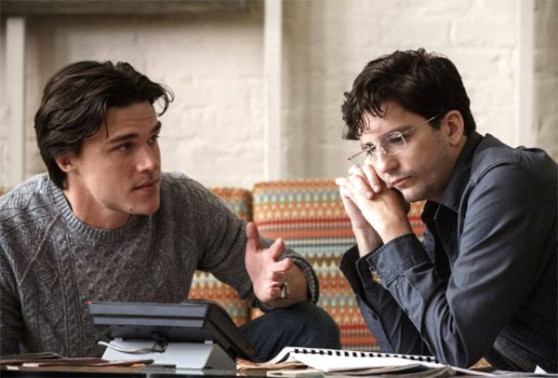The Big Short: The Moneyball of finance cinema

Jaap Buitendijk / Paramount
And not just because it’s also based on a Michael Lewis joint.
My impatience with tin-eared fiscal “thrillers” is well-documented, so while I had some hope for The Big Short going in, I tried to keep it in check. Yes, it’s based on a book by Michael Lewis, who knows his shit, but that doesn’t always translate. Having now seen two Lewis adaptations that do work, my theory is that it’s the tone; you have to come at it as a comedy, or at least a light caper.
TBS‘s amazing cast helps — Magnussen! Wittrock! Linklater! Carell, overdoing it slightly but still compelling! — but I think it’s primarily the use of a comedy director (Anchorman‘s Adam McKay) and the willingness not to take Wall Street’s self-importance at face value that makes the difference. Most of us don’t need the preening I’m-rich-because-I’m-rightness of these dudes (and sometimes ladies, but: usually dudes) underlined; if you’re old enough to see this film, you remember 2008, and you get it. What you might not get on the granular level is how the collapse came about, and McKay’s script is a very smart way to handle a subject that’s tough to make go in a visual medium, especially when 1) the explanation isn’t necessarily given visually, which makes it more challenging to follow; and 2) we already know the ending.
It’s done elegantly and with wit, versus the dour self-righteousness so common to this subgenre when the films are helmed by people who haven’t spent any time in this world and think they have to make sure we know they capital-D Disapprove. At over two hours long, it feels much shorter, which is a major accomplishment for a fiscal-shenanigans flick. Recommend!
Tags: Adam McKay Anchorman Billy Magnussen Finn Wittrock Hamish Linklater John Magaro Michael Lewis movies Steve Carell The Big Short The Blind Side





I also liked the movie, even though I still don’t understand Gosling’s makeover. Why the brick-colored foundation? It’s not like the guy he played is famous enough that we’d be mad at somebody playing him who didn’t look like him, and they didn’t even give him the real guy’s real name!
But you’re right. The pacing is aces, and the tone is just right.
I just saw The Big Short over the weekend myself, and I liked it a lot (although I didn’t love the Margot-Robbie-in-the-bathtub scene as much as everyone else apparently did?). I think it did a good job at the end of demonstrating the real human cost of the collapse without being too heavy-handed about it – as you said, if we’re watching the movie, we remember what happened. At the same time, seeing the family living out of their car in the gas station parking lot was very effective, and seeing Schmidt and his bro at the employment expo was satisfying but still sad.
The other thing that I think it did really well is make it clear that, while it’s absolutely upsetting that our main characters were profiting from this disaster, there really was nothing they could have done to prevent it – they saw it coming, but no one would listen to them. If there’s an opposite of the boy who cried wolf, but who’s still kind of a dick, it’s these guys.
(Also, brief nod to the Again With This podcast – I loved the character who was chewing gum throughout the film. That’s how you do it, Priestley.)
While I liked the movie and the book, I had the same problem with both. Way, WAY too easy on the people who got these mortgages. Yes, there was predatory lending. Yes, very educated rich people ruthlessly exploited poor and less educated people to make themselves richer.
However, there was also a complete lack of common sense on the part of those poor people. We the audience are supposed to sympathize with the stripper who thinks she can and should own five houses and a condo? That evil Max Greenfield and Billy Magnussen were taking advantage of her? There was another story in the book, I remember something a guy mortgaging a trailer for five times it’s value or something like that. I know I sound like a Republican (shudder) but honestly…
Sure I’m infuriated at the bankers, the CEOs who knew nothing about what their own companies were doing, the criminally negligent rating agents, etc., etc. and I want them tarred and feathered. But I also have seen no greater argument that every American high school student should be required to complete a course in basic personal finance to graduate.
“there was also a complete lack of common sense on the part of those poor people.”
Right. Those poor people who paid money to the finance guys that said “here’s the deal you should do, you get a nice big house and you won’t have to pay a lot for it”. And those poor people thought “Maybe I don’t understand everything about this deal, but I figure he understands the deal and whether I ought to take it, and I am paying him to give me good advice.”
I can’t exactly blame people who went to the experts and did what the experts said. If every banker in the universe had been saying “FOR THE LOVE OF GOD, DO NOT DO THIS DEAL” and the person did it anyway, that’s one thing. But as late as 2007 mortgage people were still trying to sell me on 100%-financed 5/1 ARMs.